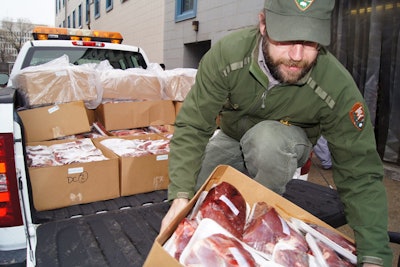
According to the U.S. Environmental Protection Agency, Americans generated more than 37 million tons of food waste in 2013. In fact, the agency estimates that more food reaches landfills and incinerators than any other single material in trash. Due to fluctuations in attendance—and appetites—events such as meetings and trade shows often generate leftovers. The good news is that federal law protects organizations and individuals from liability issues when they donate “apparently wholesome food” in good faith to a nonprofit organization. Here’s a roundup of some of the groups around the United States and Canada that can help get excess food into the mouths of people who really need it. Each one has different guidelines as to the type of food it can accept, so planners should contact the organization in advance, ideally at least one week before the event, to determine feasibility and to give the organization enough time to schedule the pickup.
Austin
The Capital Area Food Bank of Texas, founded in 1981, rescued more than 18 million pounds of food in 2015 from convention centers, hotels, caterers, grocery stores, and other food industry companies. The organization delivers food to 250 partners in 21 counties across central Texas that then serve it to those in need.
Boston
Lovin’ Spoonfuls uses refrigerated trucks to pick up excess perishable food from venues, grocery stores, and other food establishments around the city every day. The organization delivers the food that same day to about 100 nonprofit partners, including homeless shelters, soup kitchens, and other social assistance agencies. Since its founding 2010, Lovin’ Spoonfuls estimates it has rescued nearly four million pounds of food.
Chicago, Minneapolis, and Nashville
Zero Percent is a Chicago-based organization that coordinates food rescue in Chicago, Minneapolis, and Nashville. The organization either does the pickup itself or arranges it to be done by one of the nearly 100 nonprofit partners it works with in those three cities, such as soup kitchens, homeless shelters, and after-school programs. Zero Percent estimates it has facilitated the distribution of more than 930,000 meals since it was founded in 2013.
Las Vegas
Founded in 2007, Three Square is a food bank serving southern Nevada, where about 15 percent of the population is considered “food insecure.” The organization distributed more than 38 million pounds of food in 2015 through its work with 1,300 community partners. Three Square drivers pick up food from hotels and conference centers, as well as manufactures, retailers, and farmers, and then as many as 150 volunteers each day sort and pack meals and assist with administrative tasks.
Montreal, Toronto, Calgary, and Ottawa
La Tablée des Chefs operates a Sustainable Food Brokerage service in several Canadian cities, as well as in Mexico and France. The program manages all of the logistics to facilitate food donations from hotels, restaurants, and venues to organizations that serve the needy. The organization has been coordinating food rescue since about 2006 and estimates that it redistributes about 500,000 meals every year.
New York
City Harvest was founded in 1982, making it one of the oldest food rescue organizations in the United States. City Harvest estimates it will collect 55 million pounds of excess food from hotels, caterers, restaurants, corporate cafeterias, and more this year. It delivers the food to 500 soup kitchens, food pantries, and other community food programs across New York, helping feed nearly 1.4 million people each year.
Orlando
Second Harvest Food Back of Central Florida is one of the agencies that collects excess food from events at the Orange County Convention Center and other venues around Orlando. The organization, founded in 1983, rescued enough food for 43 million meals in 2015. Second Harvest works with 550 feeding programs in six counties, including emergency food pantries, soup kitchens, and senior programs.
Phoenix
Waste Not picks up food six days a week from resorts, restaurants, caterers, and other food purveyors around the Phoenix area, where it says more than one-third of the population lives in poverty. The organization collects an average of 6,000 pounds of perishable food each day and delivers it that same day to more than 100 agencies such as schools, daycare centers, and senior facilities.
San Francisco
Food Runners has more than 200 active volunteers who pick up excess food from hotels, catering companies, venues, and more around the city. The organization estimate it relays enough food for more than 5,000 meals each day to about 300 group homes, homeless shelters, after-school programs, and senior apartment communities. The organization was founded in 1987.
Washington
D.C. Central Kitchen receives all leftover food from the Walter E. Washington Convention Center, RFK Stadium, and other venues owned by Events DC as well as from dozens of hotels and other facilities. The food is used to prepare 5,000 meals each day that are delivered to one of its 80 nonprofit partners, such as homeless shelters, halfway houses, and after-school programs, which then serve it to the needy. D.C. Central Kitchen reports that it recovered 807,534 pounds of food in 2014 and saved its partner agencies $3.7 million in food and personnel costs.
Various locations
Rock and Wrap It Up is a nonprofit organization founded in 1994 that works with partners across the country to address issues of hunger and poverty. The organization facilitates the collection of excess food from hotels, arenas, stadiums, sports franchises, production companies, hospitals, and more. It also maintains an online database called Hungerpedia, which lists contact information for agencies around the country that accept donations of food and other items for the needy. Rock and Wrap It Up also provides an app known as the Whole Earth Calculator, created in partnership with EventMobi, which allows planners and other donors to convert the total pounds of food donated into meal equivalents and carbon dioxide averted equivalents and to easily share that information on social media.



















